Francisco Pereira steps into a loop he has just created with a few twists of rope. With its help and his own strength and dexterity, he quickly climbs five meters up the side of a palm tree standing on the bank of the Moju River. But he isn’t climbing this tree to get a better view of the river as it flows through the northern part of the Brazilian state of Pará. Instead, his focus is directed at a multi-stemmed branch carrying dozens of purple-colored açaí berries. Francisco Pereira swiftly removes the branch from the tree with a little tug. He grabs a few more and descends back to the ground.
It is harvest time in Jauari. The producer association consisting of 35 families makes its living on the vast biodiversity of the Amazon region. They plant, nurture and harvest fruits and nuts on 50 hectares of land. The oils and butters from these raw materials are processed and used in the cosmetics industry. The program was started in the mid-2000s by Natura, Brazil’s largest natural cosmetics manufacturer, and currently involves over 3,000 families. The company commits to purchasing entire harvests, supplies agricultural know-how and places a strong emphasis on social aspects. In addition to a fair price for their harvested goods, the farmers receive 5 % of the sale price for the final products containing ingredients from the plants grown by each village. (more on the sustainable approach in the interviews on pages 42 and 43.) Symrise is closely involved in this process as a partner and supplier. It now produces oils and butters from seven raw materials (andiroba, murumuru, Brazil nut, cupuassu, açaí, buriti and cocoa) and sells these to Natura and other customers. “All sides benefit from this arrangement,” says Adelino Nakano. The chemist, who is responsible for hair care and innovation at Symrise in São Paulo, is visiting Jauari today. The site is 70 kilometers away from the city of Belém and its 2.3 million inhabitants. It is not a typical business trip: He greets Francisco Pereira with a hug and gives his mother two kisses on the cheek. Only after a long conversation about family and health over a very sweet cup of black coffee does the conversation turn to business-related topics.
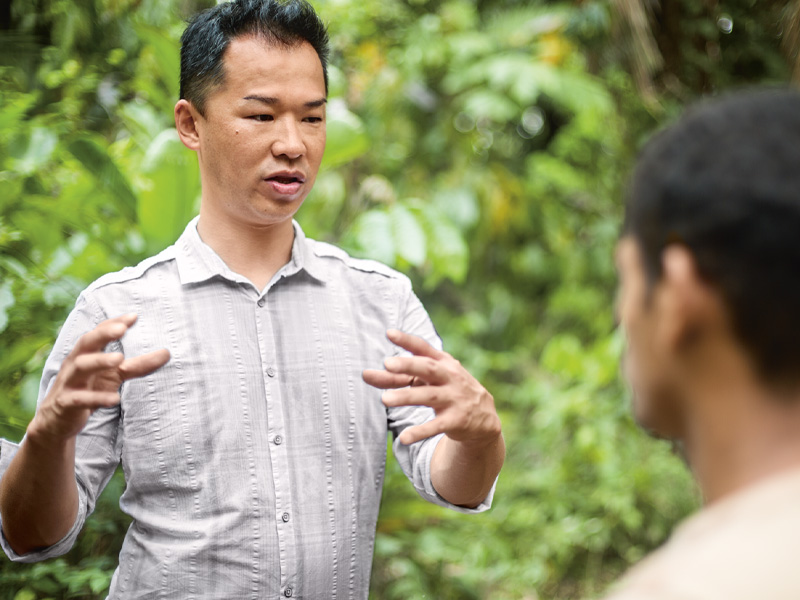
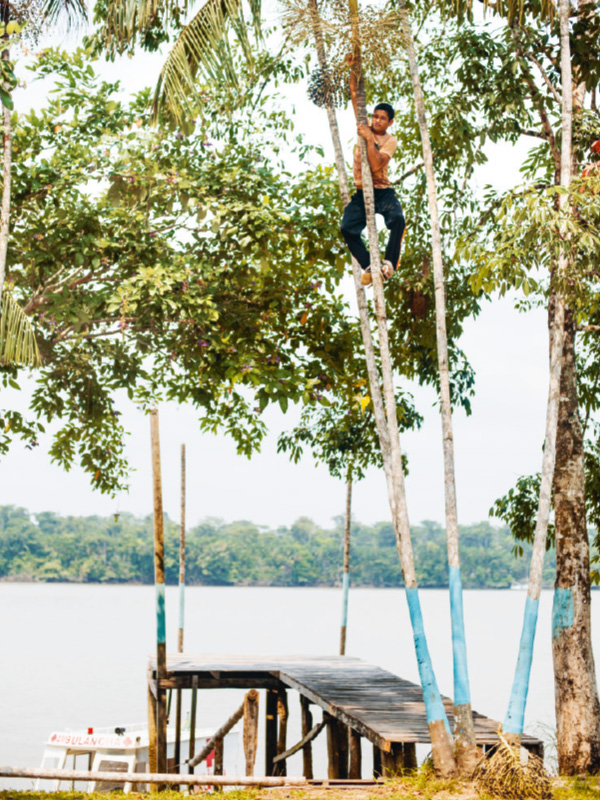
“We are assessing various raw materials on whether and how we could use them in the future,” explains Adelino Nakano. He bends down and picks up a brown, woody seed. “This is an andiroba seed, which we already process.” Next, he plucks some leaves from a tree and rubs them between his hands. He smells them. “These are interesting plants,” he says and jots down the name of the tree given to him by a village resident. “Its fragrance is very fine. It could be of interest to our perfumers – perhaps for household products.”
“All sides benefit from this arrangement.”
Adelino Nakano
is responsible for innovations at Symrise in São Paulo.
Mr. Ramos, how do you ensure a fair cooperation with the village communities?
We work in strict compliance with the Nagoya Protocol of the United Nations, which regulates the use of regional raw materials by international companies. It also requires compensation for the producing state.
This approach is particularly focused on the local population. What about nature? How is biodiversity being protected?
Symrise has entered a strategic partnership with the Union for Ethical BioTrade. Everyone benefits from this arrangement, including Symrise: Our flavors, fragrances, cosmetic and functional ingredients depend on natural raw materials.
So Symrise benefits from this commitment?
Of course! It is the only way that we can successfully produce our products and deliver them to customers around the world. At the same time, sustainability is only possible in combination with business success.
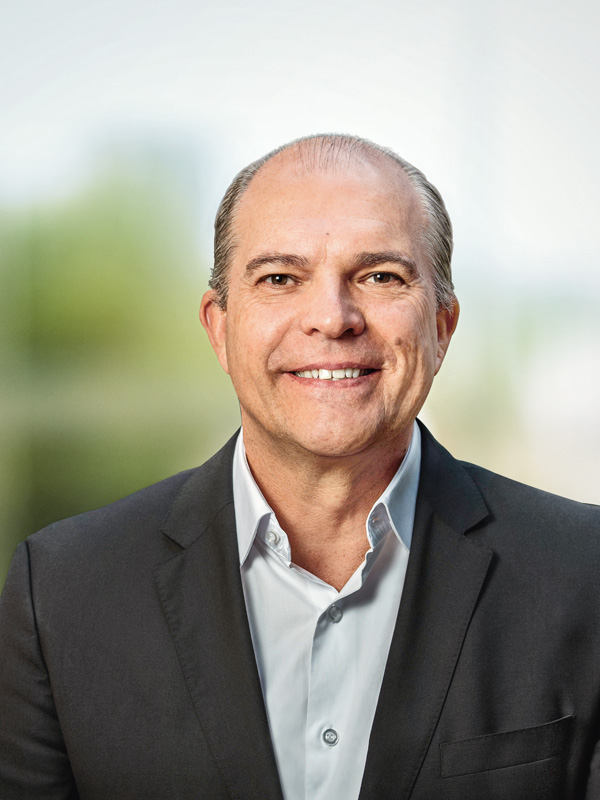
Eder Ramos is responsible for the global cosmetic ingredients business at Symrise.
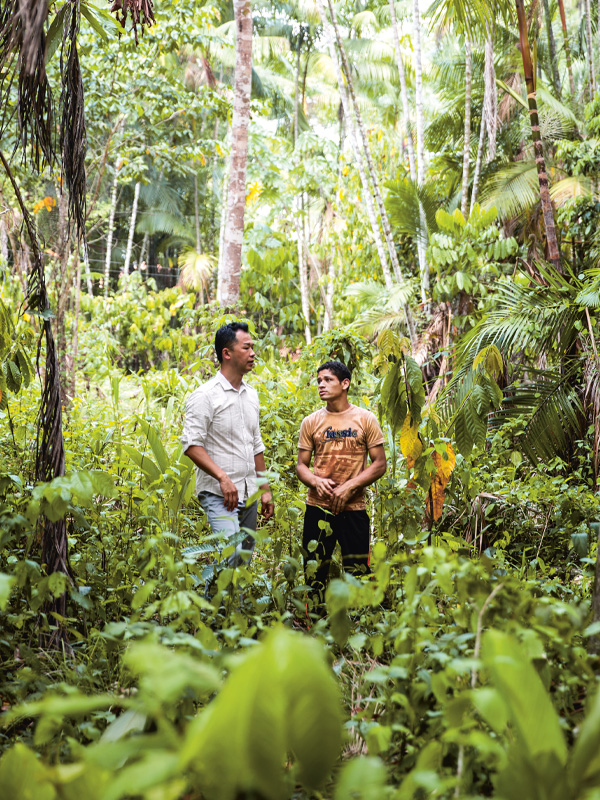
Villages of experts
Finding the right plants, learning about their potential uses, planting and harvesting them – the people of the Amazon region, who live along the expansive rivers or in the rainforest, are a great resource when it comes to accomplishing these tasks. They are very familiar with the plants and often have extensive knowledge about them. Francisco Pereira’s father, who moved here 25 years ago, is a great example.
He, too, does not shy away from working with companies to achieve greater goals. When he talks about the cooperation, he often uses the word “family.” Francisco Pereira expects trust-based relationships with the companies, regardless of how big they might be, and wants values like reliability, openness and transparency to be reflected in any contracts. “It is very important to us that the companies treat us fairly,” he says. For Symrise, this is a matter of course. The company wants to further strengthen its direct business relationships with these villages and works with them in strict compliance with the Nagoya Protocol (see interview on page 42 – 43). In addition to this, Symrise recently presented the village with a special present: a white boat for transporting people to the nearest doctor. “We have cut travel times to the doctor by 85 %. That can save lives,” notes Adelino Nakano. The boat has already traveled up and down the river several dozen times, saving the residents from having to take alternate, more hazardous routes over land. In the coming months and years, Symrise wants to expand the cooperation. “We will closely assess which raw materials are suitable and decide together with the village communities on how to progress.” The innovation manager is also working on cooperation with local universities in the Amazonian region. “The researchers have identified about 3,000 different plants that we are evaluating for usability,” he explains excitedly. “In doing this, it is important that we use good agricultural practices and keep land and water use to a minimum.”
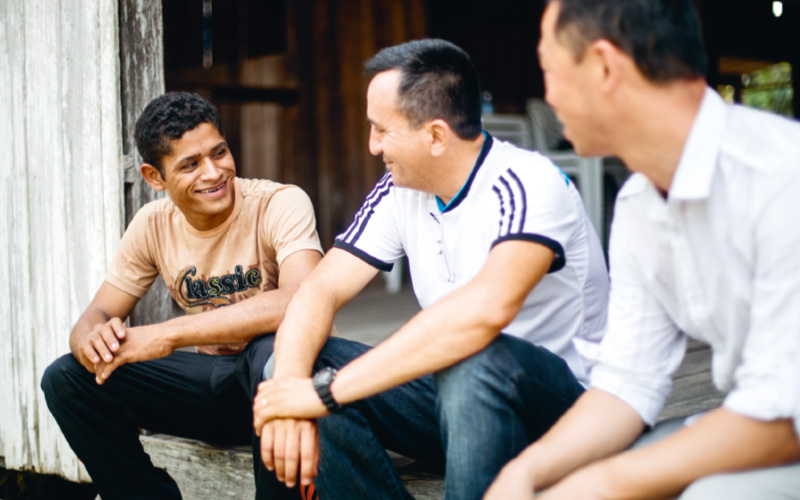
It’s not unusual for Francisco Pereira from the producer association and Symrise employees Ferdinando Prado and Adelino Nakano (from left to right) to talk shop on the steps of the association building.
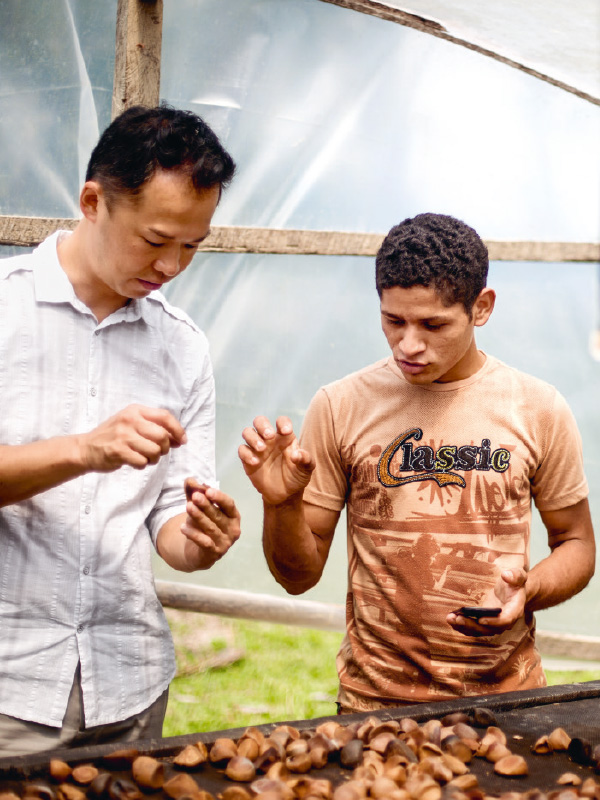
Francisco Pereira (right) shows Adelino Nakano the variety of the fruit and nuts harvested by the farmers in the forest.
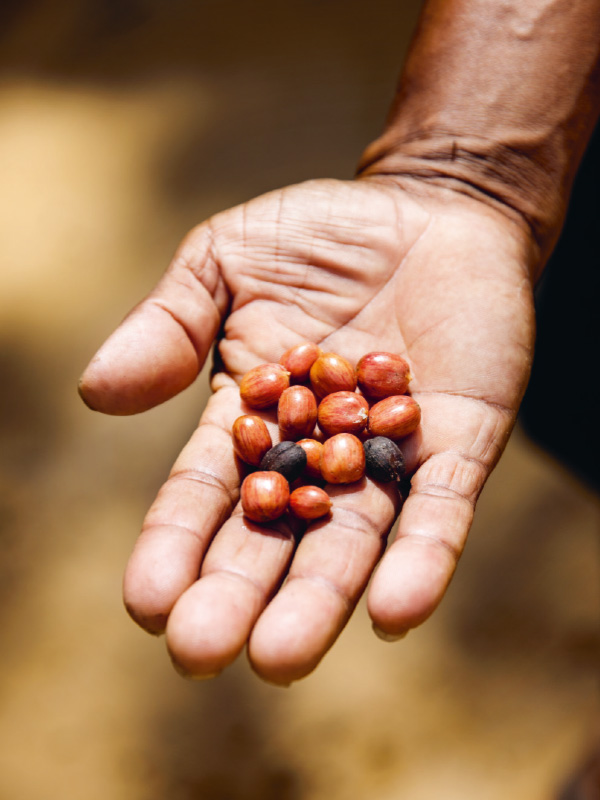
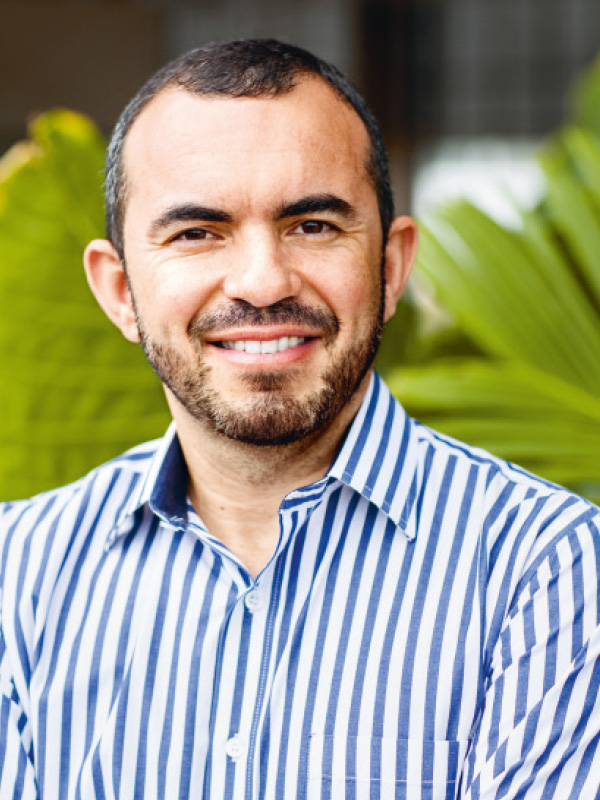
Walter Ribeiro is President of the Flavors Division Latin America.
Mr. Ribeiro, the focus of the Amazon project has so far been on the Scent & Care Segment. Where do you see opportunities for new flavors?
We have visited several producer associations and university facilities and have run into some spices that seem to be well-suited as bases for extracts. We also collected ideas for natural colors, which could be of interest for our colleagues from the Diana division.
How important are the village residents for you in terms of what they bring to the cooperation?
They have a very close relationship to nature and specifically to the impressive variety of local plants. We can learn a lot from them.
Do you think there are any synergy effects available for your segment at the Ecoparque production facility?
Definitely. For example, we could gain brand new flavor nuances from established raw materials with our SymTrap® technology. Furthermore, through our colleagues from S & C Segment we were involved here at a much earlier stage than our competitors thanks to our cooperation with Natura. That puts us in an advantageous position.
Sustainable production
Fruits, seeds and nuts are processed at the Ecoparque, a further important component of the Amazon project. Natura developed the industrial park in Benevides, constructed its own production facilities there and designed the site to be as sustainable as possible. For instance, the offices hardly need electric lighting as they were designed to make use of natural light. Rainwater is collected and used water is purified via a sophisticated ecosystem: It initially flows through three layers of different-sized gravel. Then microorganisms in the roots of local flowers and plants break down the remaining organic material.
So far, Symrise is the only foreign company to have built a production facility at the site. The company invested € 5 million in the project, explains Ferdinando Prado, who helped design and construct the facility. On this particular day, Brazil nuts are about to be processed and are lying on palettes in orange netting. Many steps are required to extract the clear oil from them that is used in cosmetics. After the incoming goods are inspected, they travel via conveyor belt and a shaking tray, which removes any remaining debris like leaves and small rocks, to a silo. From there, they land in a tank where they are heated in three phases to a temperature between 60 and 70 degrees Celsius. “There are two reasons for this: They can be more easily broken down at this temperature and the oil becomes more fluid, which makes it easier to extract,” explains Ferdinando Prado. The mechanical engineer stands in the warm hall and checks the presses. “A Brazil nut consists of up to 40 % oil. Other seeds like andiroba or cupuassu only contain about 25 %,” says the technician, who joined Symrise to work at the Ecoparque. The engineer has a great deal of experience and knows the machinery like the back of his hand. On one side of the press, a dark brown oil is flowing down a channel to a filtering system. There, it is squeezed through nine thick cloth filters. Finally, a golden yellow fluid flows from several taps into a tank. The raw oil could already be used in this form, but it is further refined for the cosmetics industry: Two additional machines are used to remove its color and odor.
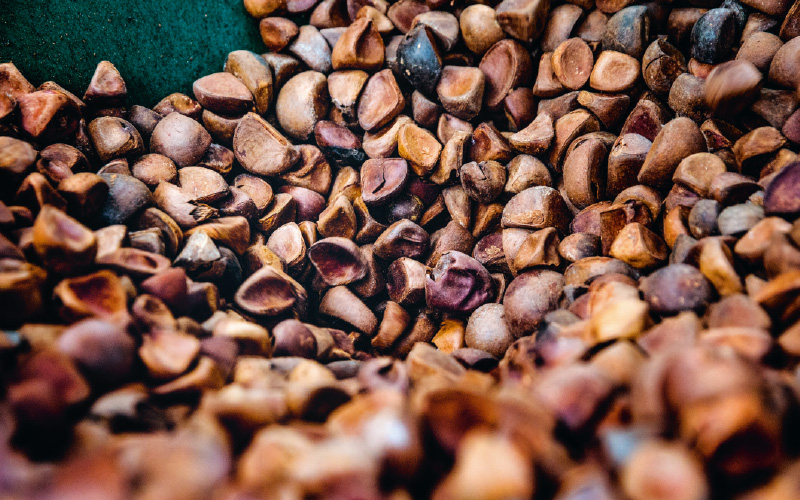
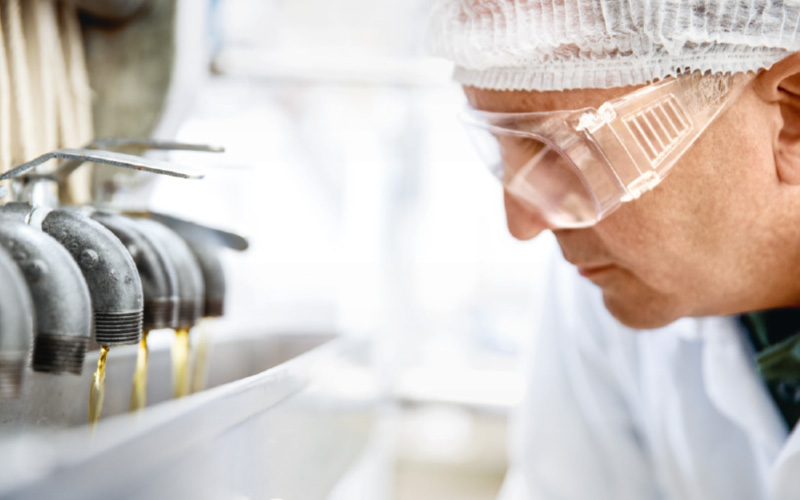
The Brazil nuts are chopped up and pressed and then filtered to create a golden yellow, highly aromatic liquid.
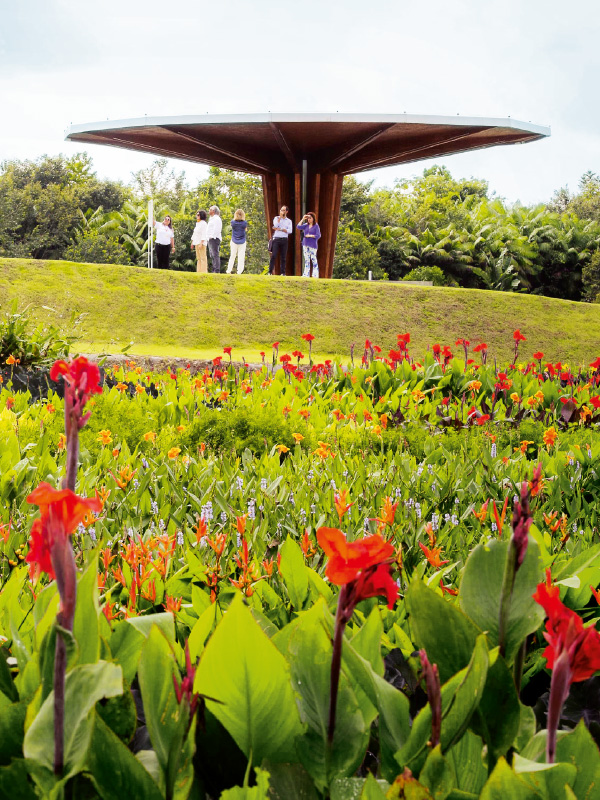
A blossoming natural filter system in the Ecoparque purifies used water and collects rainwater using a large, funnel-shaped structure.
Prado ascends some stairs. Through a window, one can see work being done to reassemble a facility for plant extracts that was moved here from the old site in Sorocaba. Prado opens a door and enters a small laboratory. Here, the seeds are checked according to 15 parameters, such as moisture, acid, peroxide and sulfur content, throughout the process. Microbiological properties are also tested to ensure that no undesired bacteria has contaminated the product, while color and odor are tested in the sensory laboratory. Along with pressing and extraction, Symrise also uses its proprietary SymTrap® technology to extract valuable aromatic substances from residual materials. Over the course of 2016, Symrise will present the entire portfolio to further customers in the fragrances industry. Production will be able to expand without problems to meet rising order volumes, explains Ferdinando Prado. “At the moment, we are operating with only a single shift and ten employees. We could expand that to a three-shift system.” In a final step, Symrise will also install a production facility for essential oils in an already constructed part of the hall. “We will test and further develop raw materials for two of these products in parallel during 2016,” adds Ferdinando Prado. “And that is only the beginning of a long list of solutions inspired by the Amazon region’s rich biodiversity.”
Sharing values and goals
Symrise and Natura are two companies that operate according to the same principles. They both place a strong emphasis on nature and social commitments. A discussion on partnership, sustainability and business success.
Mr. Lima, what does sustainability mean for Natura?
Roberto Oliveira de Lima: It has been at the heart of everything we do since our founding in 1969. Our success depends on the quality of our products, the added value they provide to customers and the sustainable network that we have developed with our suppliers. One focus of our strategy is to develop together with our partners at all levels. This only works if they have the same values we do. That’s why we look for suppliers who fit that mold, for example.
Ricardo Omori: Symrise follows the same approach – that is why our cooperation is such a good fit. The Ecoparque is a perfect example of this. For us, it was no problem to move some operations to the sustainably designed industrial park that Natura developed. Our commitment to nature, society and the socioeconomic development of the regions we operate in is part of our core business.
Symrise is allowed to sell the products resulting from the raw materials generated by this joint project to other customers. Why don’t you insist on exclusivity?
Roberto Oliveira de Lima: Because this would limit opportunities for our suppliers. Our primary goal is to benefit the Amazon region. That is why we use as many ingredients from the region as possible. It is good for the farmers if a company like Symrise is able to supply other customers because it allows them to expand and diversify their sales channels.
Ricardo Omori: This approach is the right one and sustainable for all involved. Of course, we feel very indebted to Natura: It was much easier for us to build relationships with the producer associations and construct the production facilities at the Ecoparque with this strong partner. At the same time, it is a tremendous advantage to have the freedom to sell the products on a global scale to spread the value creation across a broad basis.
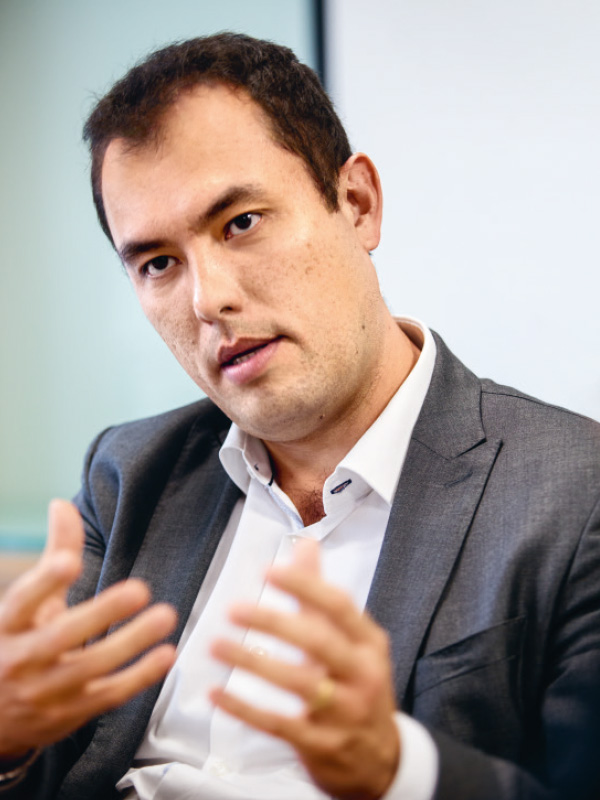
Ricardo Omori is responsible for Symrise’s Scent & Care business in Latin America.
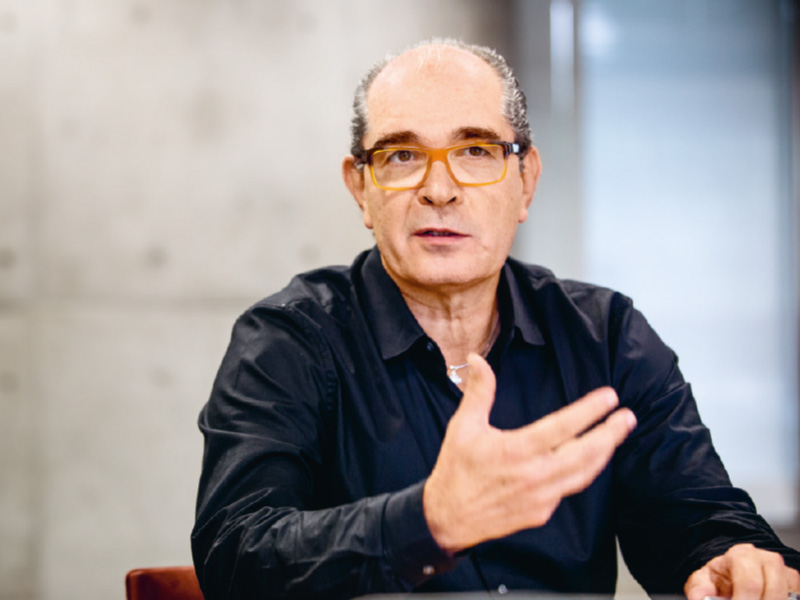
Roberto Oliveira de Lima is CEO at Natura. Brazil’s largest producer of natural cosmetics primarily sells its products directly to customers in Brazil, Argentina, Chile, Mexico, Peru, Colombia and France.
“Our primary goal is to benefit the Amazon region.”
Roberto Oliveira de Lima
What expectations do you have for business in the region?
Roberto Oliveira de Lima: So far, everything is going well: 75 % of the ingredients that we need for soaps come from the region and are processed there in the Ecoparque. But talking specifically about the future is never easy. That is because we are dealing with pure natural products, some of which have not yet been researched. Finding new raw materials can be a quick process or a very long one. So far, we have ten ingredients in our portfolio that arose from Brazil’s unique biodiversity.
Ricardo Omori: We have the same view. Because we work with pure natural products, some of which come from little-known fruits or seeds, we need to advance research. We perform this research together with Natura and universities in the region. Symrise has invested many euros solely in equipment used to further investigate materials and we are currently developing a team that specializes in the local biodiversity. This will allow us to regularly develop new and exciting products over the coming years.
